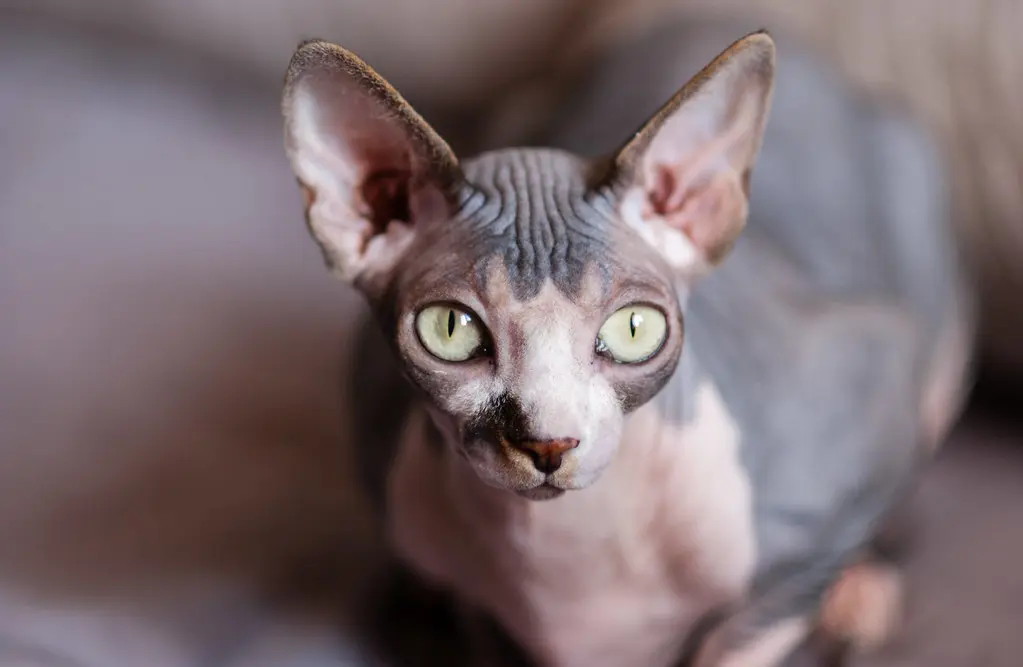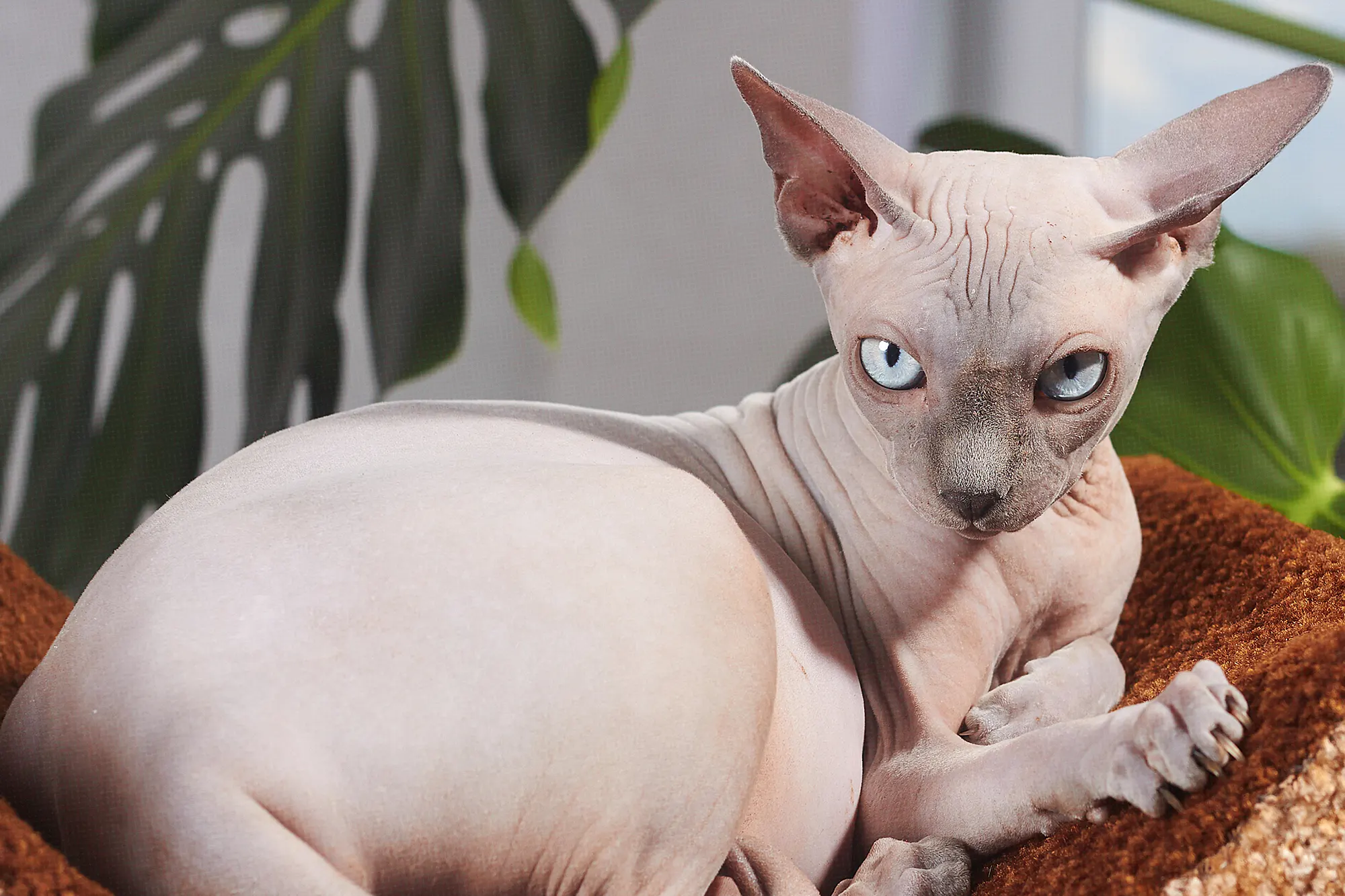Sphynx cats are one of the most popular cat breeds today. These hairless felines are known for their unique appearance and charming personalities. In this post, we’ll take a closer look at all aspects of Sphynx cat care, including their behavior, personality, diet, lifestyle, and more. By the end, you’ll have a better understanding of what it takes to care for a Sphynx cat and how to provide them with a happy and healthy life.
 The Sphynx Cat At A Glance
The Sphynx Cat At A Glance
Family: Felidae
Class: Mammalia
Lifespan: 8-14 years
Length: 12-15 inches
Weight: 6-12 pounds
Energy Level: High
Personality: Affectionate, curious, active, social, intelligent, playful
Temperament: Outgoing and extroverted
Intelligence: A highly intelligent breed, capable of learning and problem-solving
History

This breed began in 1966 with a domestic cat giving birth to a hairless kitten in Toronto, Canada. This unique trait was caused by a natural genetic mutation and through selective breeding and out-crossing to cats like the Devon Rex, the Sphynx breed was created.
Sphynx Cats, also known as hairless cats, are a unique and intriguing breed that capture the attention and heart of many. Despite their unusual appearance, they’re well-known for their playful and affectionate nature. Sphynx cats were recognized for competition in the Championship class by The Cat Fancier’s Association (CFA) in February 2002, rounding up their eventful history.
Appearance

They do not entirely lack fur; instead, their skin has a fine layer of down which gives it the texture of suede. They have a strong, muscular body with a barrel chest and potbelly.
Facial Features
Sphynx cats have a distinct face with large lemon-shaped eyes, prominent cheekbones, large ears, and a friendly, open expression. The colors of their eyes and skin can vary greatly.
Perhaps best known for their striking and unusual appearance, the Sphynx cat breed is more than just its hairless body. These fascinating felines possess a range of distinctive traits and behaviors that make them a delight for cat enthusiasts. Let’s delve deeper into understanding these charming, enigmatic creatures.
Behavior

Affectionate Nature
Sphynx cats are noted for their immense affection towards their owners. They form strong bonds with their human companions and often express their affection openly. This might include grooming their owners, curling up in their laps, or even attempting to help with tasks around the house. It’s not unusual to find a Sphynx cat following their owner around the house, wanting to be involved in everything they do.
Playful and Energetic
Sphynx cats are not just affectionate; they are also high-energy felines who adore playing. Known for their playful nature, these cats are active fliers and climbers who enjoy jumping and running. Providing them with ample playtime and mentally stimulating toys is important. Failure to engage a Sphynx cat in active play can lead to boredom, which may turn into destructive behavior.
Intensely Curious
Their curiosity knows no bounds, and they love to explore their surroundings in-depth. This exploration isn’t limited to floor-level either, with many Sphynx cats choosing to clamber over furniture, climb cat towers, and explore high shelves. This deep-seated curiosity makes them intelligent and adept at problem-solving.
Social Animals
Sphynx cats also display a sociability that extends beyond their human owners. Often, they get along well with other animals in the house – be they other cats, dogs, or even smaller pets. A multi-pet household will rarely phase a sphynx cat, though introductions should always be performed carefully to ensure a smooth transition.
Expressed Need for Warmth
Given their lack of fur, Sphynx cats also show unique behavior when it comes to seeking out warmth. They are known to cuddle up with their human companions, other pets, or bask under the sunlight entering through a window to keep warm. While adorable, it’s a pragmatic approach to maintaining their body temperature and something potential owners need to account for when considering this breed.
In essence, a Sphynx cat is a wonderful, vibrant mix of quirks and distinctive traits that set them apart from many other breeds. Their behavior contrasts their alien appearance — making them a true companion and family member.
Diet

They are not prone to obesity, thanks largely to their energetic nature and faster metabolism. However, a diet that does not meet their energy needs can lead to weight loss and other health issues.
Nutritional Needs
Sphynx cats have certain nutritional requirements that are crucial to their overall health:
Protein
As obligate carnivores, Sphynx cats require a diet rich in high-quality proteins, sourced mainly from animal tissues. Protein should make up the bulk of their diet, providing essential amino acids that support their growth, tissue repair, and muscle maintenance.
Fats
Fats are also essential for the Sphynx’s diet, as they support skin health, brain function, and provide a concentrated energy source. Look for diets containing omega-3 and omega-6 fatty acids, which help maintain their unique skin and overall health.
Vitamins and Minerals
Sphynx cats need a variety of essential vitamins and minerals in their diet, such as Vitamin A, D, E, and B-complex vitamins, which contribute to their overall wellbeing and immune system. Minerals like taurine, calcium, and phosphorus are crucial for bone health, heart function, and overall growth.
Feeding Frequency
Due to their higher metabolism, Sphynx cats may need more frequent meals compared to other breeds. Smaller, more frequent meals can help support their energy levels throughout the day. For most Sphynx cats, feeding three to four small meals a day is ideal.
Choosing Between Wet and Dry Food
Both wet and dry cat food can form the basis of a healthy Sphynx diet, but wet food is generally recommended due to its higher moisture content, which helps support hydration and overall kidney health. A mix of wet and dry food could also provide a balanced diet and ensure your Sphynx cat receives the required nutrients.
Foods to Avoid
Certain foods are off-limits to ensure your Sphynx cat stays healthy. Never feed your Sphynx the following:
- Chocolate
- Caffeine
- Alcohol
- Raw eggs, meat, or fish
- Grapes and raisins
- Onions, garlic, and chives
- Dairy products
To avoid risking your Sphynx cat’s health, always double-check whether human foods are safe for them.
A well-balanced and nutrient-rich diet is essential for the health and wellbeing of your Sphynx cat. By understanding their unique requirements and considering factors like portion control, feeding frequency, and suitable food types, you can confidently provide the best diet for your hairless companion.
Grooming/Care

For starters, they need to be regularly bathed to remove the excess oils and dirt that their skin can accumulate. Their ears also require regular cleaning as they can develop a buildup of earwax. Sphynx are susceptible to sunburn and cold due to the lack of fur, and thus need protection from excessive sun exposure and cold temperatures.
Exercise
As playful and active cats, Sphynx cats require regular exercise to maintain their physical health and prevent obesity. Interactive toys, climbing trees, and puzzle feeders can all keep them stimulated and active. Exercise not only helps to burn calories but it can also prevent boredom and the potential behavioral problems that can come with it.
Health Issues
Sphynx cats are generally healthy but they do have predispositions to certain genetic health conditions. They are more prone to develop heart disease, specifically Hypertrophic Cardiomyopathy (HCM), and certain neurological conditions. Sphynx cats also face a higher risk of skin cancer due to their exposure to the sun. Regular vet checkups are necessary to monitor their health.
Housing Options
Sphynx cats should ideally be indoor pets. Their lack of fur makes them more susceptible to temperature extremes, and they also risk sunburn if exposed to strong sunlight. The adventurous nature of the Sphynx can pose a problem if they’re allowed outside unsupervised. They are social animals and need the company to prevent loneliness. If left alone for long periods, they can get bored and potentially develop behavioral problems.
Fun Facts
- Warmth Seekers: Sphynx cats have a high metabolism due to their lack of fur, making them heat-seeking felines. They love snuggling up to their human companions or seeking out warm spots in the house to stay cozy.
- Velvety Skin: Despite being hairless, Sphynx cats have a velvety soft and warm skin, making them a delight to touch and cuddle.
- Purr Machines: Sphynx cats are known for their loud and frequent purring. Their affectionate nature and contentment lead to constant purring when they’re happy and relaxed.
- Bathtub Lovers: Unlike most cats, Sphynx cats often enjoy water and may show an interest in playing or splashing in the bathtub. Some even enjoy joining their owners for a shower or bath.
- High-Five Experts: Sphynx cats are clever and can be trained to do various tricks. They are particularly good at learning to give “high-fives” and respond well to positive reinforcement.
- Living Art: With their unique appearance and expressive faces, Sphynx cats are often compared to living works of art, captivating the hearts of artists and cat lovers alike.
- Ears Express Emotions: Sphynx cats have large ears that can move in different directions, allowing them to express a wide range of emotions and curiosity.
- Hypoallergenic Myth: While Sphynx cats are often considered hypoallergenic due to their lack of fur, they can still produce allergenic proteins from their saliva and skin, which may trigger allergies in sensitive individuals.
- Sunbathers: Despite their sensitivity to the sun, Sphynx cats love soaking up warmth. They can often be found basking in sunny spots by windows or following the sun’s rays around the house.
- Social Butterflies: Sphynx cats thrive on human companionship and love to be the center of attention. They enjoy being involved in their owners’ activities and are known for their extroverted and sociable personalities.
Final Thoughts
In conclusion, the unique and lovable Sphynx breed, with its many peculiar traits and special needs, offers a rewarding, albeit slightly demanding companionship. It’s crucial to make informed decisions based on understanding and willingness to meet their care and health requirements to ensure a comfortable and fulfilling life for the feline.
